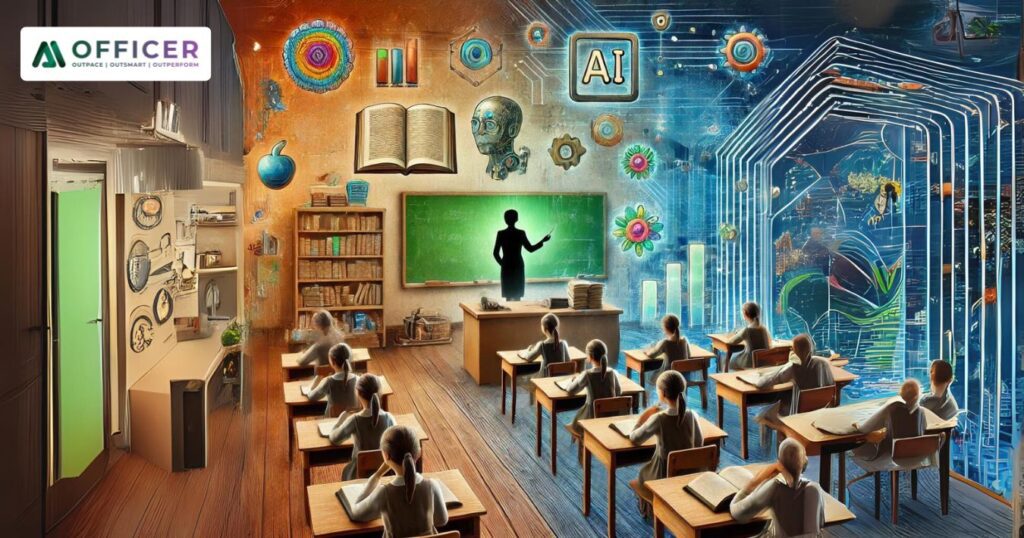
Here we are approaching the end of 2024, with many educators still hesitating to embrace AI tools in their teaching.
But why? It’s not like AI tools don’t offer benefits—automated grading, personalized learning experiences, even virtual teaching assistants that could free up valuable time for lesson planning.
Still, the adoption rate is surprisingly slow, particularly among traditional educators.
Could it be fear of the unknown? Maybe.
Or perhaps it’s the misconception that AI will replace teachers, not enhance their capabilities.
Whatever the reasons, it’s crucial to understand what’s holding them back because the stakes are high.
As businesses, schools and even governments push for digital transformation, education can’t afford to be left behind.
Ignoring AI isn’t just about clinging to old ways; it’s about potentially shortchanging students who deserve the best tools for learning. So, why are some educators resistant to change? And more importantly, what can we do to bridge this gap?
The truth is, this reluctance is multifaceted, influenced by factors ranging from lack of technical training to concerns about student data privacy.
WHY SOME EDUCATORS RESIST AI ADOPTION [THE RELUCTANCE]
While AI offers clear advantages in education, several hurdles are keeping educators from diving in. Understanding these challenges is key to addressing them effectively.
1. Lack of technical training
Many teachers feel unprepared to integrate AI tools into their teaching methods. Unlike younger generations growing up with tech, some educators face a steep learning curve. Schools often lack the resources for ongoing professional development, leaving teachers feeling overwhelmed by the sheer complexity of AI tools.
2. Fear of job replacement
One of the biggest fears is that AI might eventually replace teachers. This misconception is fueled by media coverage showcasing AI advancements like virtual tutors and automated grading systems. However, the reality is that AI is designed to complement, not replace, educators. It’s a tool to enhance teaching, offering personalized learning experiences that teachers might struggle to provide in a traditional classroom setting.
3. Budget constraints
AI tools can be expensive and for many schools, particularly in underfunded regions, the cost is prohibitive. In a survey by the World Economic Forum, 43% of educators cited budget constraints as a key reason they haven’t adopted AI. Schools often prioritize other needs, like textbooks and infrastructure, over advanced technological investments.
4. Concerns about data privacy
With AI comes data, and with data comes privacy concerns. Educators worry about the ethical implications of using AI tools that require collecting and analyzing student data. Who controls this data? How is it used? These are valid concerns, particularly in regions with strict data privacy regulations like Europe’s GDPR.
5. Unclear value proposition
For some, the benefits of AI aren’t immediately obvious. The traditional teaching model has worked for decades, so why fix what isn’t broken? This mindset can make it hard for educators to see the value that AI tools bring, particularly if they haven’t been exposed to successful case studies or real-world applications.
STEPS TO ENCOURAGE AI ADOPTION IN EDUCATION [BREAK DOWN THE BARRIERS]
While these challenges are significant, they’re not insurmountable.
Here’s how we can encourage more educators to embrace AI.
1. Invest in teacher training
The key to successful AI adoption lies in empowering educators. Professional development programs that focus on the practical applications of AI in the classroom can help ease fears and demystify the technology. Schools need to invest in ongoing training to help teachers build confidence in using AI tools effectively.
2. Highlight collaborative opportunities
AI is not here to take over the classroom; it’s here to enhance it. Highlighting how AI can work alongside educators—by automating repetitive tasks like grading or attendance—can help shift the narrative. Teachers can focus more on creative, high-impact tasks, such as lesson planning and individualized student support.
3. Provide cost-effective solutions
Schools with limited budgets can start small, adopting cost-effective or even free AI tools. Open-source platforms and AI-driven tools that offer freemium models can be the perfect entry point for budget-conscious schools. As AI technology becomes more widespread, costs are likely to decrease, making it more accessible for all.
4. Address data privacy concerns
Clear policies around data usage and privacy must be established. Tech providers and educators need to work together to ensure that AI tools comply with local regulations and offer transparency on how data is handled. This will not only build trust but also ensure compliance with legal standards.
5. Showcase real-world success stories
Success breeds success. Sharing real-world use cases where AI has made a tangible difference in the classroom can inspire educators to take the plunge. For instance, schools that have adopted AI-based learning platforms have seen increased student engagement, improved test scores and a more personalized learning experience.
At AI Officer, we understand the unique challenges educators face when integrating new technology into the classroom. We offer a range of AI-powered tools designed to support, not replace, educators. Our team of AI experts is here to guide you through the process, offering tailored solutions that meet your school’s unique needs.
Get in touch with us to explore how AI can transform your classroom.
As the creators of EduAI Hub, an e-learning platform by AI Officer, for teachers and students, we have special curated courses which will showcase the best usage of AI for each of this audience. Our AI-driven solutions can provide personalized learning plans, real-time feedback and automated tools to elevate teachers & students professional development.
Let’s collaborate to create a more comprehensive and impactful learning experience for educators.
As we move further into the digital age, educators who embrace AI will not only improve their teaching methods but also provide students with the tools they need to thrive in an increasingly tech-driven world.
Stay tuned for more insights and updates from AI Officer as we continue to explore how AI is transforming industries.





